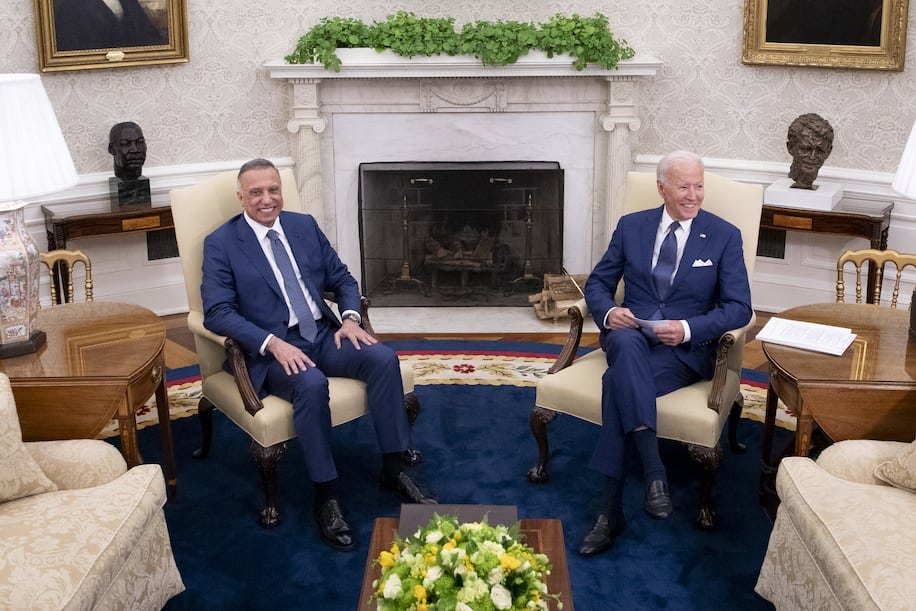
In the Washington Post, David Ignatius praised President Joe Biden’s approach toward Iraq, and compared it favorably to a messy withdrawal from Afghanistan, arguing that Iraq was on the right path in distancing itself from Iran, getting closer to America’s Arab allies and allowing for the stay of a residual US force after the withdrawal of US combat troops.
Ignatius goes as far as saying that Iran ordered its militias in Iraq to stay calm, on the occasion of the inauguration of Ibrahim Raisi as its new president, but that the militias were unhappy about Tehran’s instructions. The veteran columnist also said that Iraq has stopped buying electricity from Iran, and is switching to neighboring Arab states for electric supply. He interprets all these signs as positive developments in America’s favor.
Needless to say, Ignatius got it all wrong. None of the steps he mentioned matter much to Iran, the dominant force in Iraq.
To start with, it was wrong to assume that Iran wants US troops out of Iraq. On the contrary, Iran wants US troops to stay and serve a dozen goals for Tehran. First, the US troops give the pro-Iran Iraqi militias their raison d’etre. These militias now depict themselves as “resistance” against an imagined US occupation (US troops are deployed per a letter from the Iraqi government to the UN). Without “occupation,” the militias’ existence becomes unjustifiable.
Second, Iran takes US troops and embassy in Iraq as hostages. Whenever Iran wants to settle score with America, all it has to do is fly an explosive drone and make it hit some buildings to kill Americans.
As Americans, we tend to buy the excuses made by rulers and their thugs in the Middle East.
Many of us believe that Iran wants a negotiated settlement over its plan to produce nukes. In reality, Iran is happy dragging its feet. The negotiations keep Iran in the spotlight, often depicting her as a counterpart to America, while minimizing the risk of a surgical American military strike that destroys the Iranian nuclear program.
Also, many of us believe that Iran wants America out of Iraq and an end to war. In reality, a regime like the one in Tehran thrives off wars and has no interest in bringing them to an end, whether in Iraq or for the extermination of Israel.
For regimes like Iran, war is a lifestyle. War justifies the regime’s very existence. Without war, there will be no way for Tehran’s Mullahs to deflect attention from their failure to deliver prosperous lives for the Iranians.
So before giving ourselves and our president a tap on the back for his policy in Iraq, remember that Iran’s endgame is the preservation and strengthening of its militias in Iraq. Had Biden, or Iraqi Prime Minister Mustafa Kadhimi, said anything about disarming those militias, Iran would have unleashed hell on both the US troops and the Iraqi government.
In fact, if pundits want to single out one move that captures the failure of Kadhimi and his policies, it would be the Iraqi prime minister’s refusal to connect the assassination of anti-Iran academic Husham al-Hashimi to the pro-Iran militias. Iraqi authorities did nab the suspect who pulled the trigger, an officer in the government’s police force. Yet Kadhimi did not connect this officer to whoever sent him to commit the murder. Al-Hashimi’s assassination thus looked like personal vendetta, when in reality it was clearly an act of repression from Iran against its Iraqi opponents.
The minute that Kadhimi avoided pointing out the real culprits in Al-Hashimi’s murder was the the moment that anyone who understands Iraq realized that the country was on its way to becoming another Lebanon, where government rulers are America’s allies while the actual rulers are the pro-Iran militias.
And if you want to better understand why Iran does not want an end to the deployment of US troops in Iraq, remember that throughout the 1990s, Israel offered to withdraw from southern Lebanon, repeatedly, an offer that the late Lebanese Prime Minister Rafic Hariri wanted to take but was not allowed to by the pro-Iran forces, who refused to discuss an Israeli withdrawal and insisted on “liberating the land through force only.” Then after Israel withdrew unilaterally — thus taking away the justification for Hezbollah’s very existence — Hariri tried to convince the pro-Iran militia to disarm, since the end of occupation meant a de facto end to “resistance.” Hezbollah killed Hariri, per a UN indictment.
The solution to Iraq, Lebanon and all other wars in the region (not including Afghanistan), is to put an end to the “revolutionary” Iranian theocracy that does not know how to govern and compensates for it with ongoing wars. Everything else — the sort of the incremental steps imagined by most of the professorial US foreign policy establishment — look good on paper, but mean nothing in reality.
Like many US pundits, Ignatius, however, looks at Iraq and Iran and sees willingness to end wars, build things, and govern. Ignatius is thinking like an American. Yet to better understand Iraq, Lebanon and Iran, he should start thinking like a Middle Eastern, and in the Middle East, trouble is sometimes a way of life, not a problem that requires a solution.



الله يساعدنا و الجميع يا رب